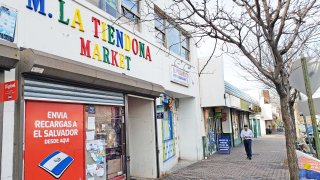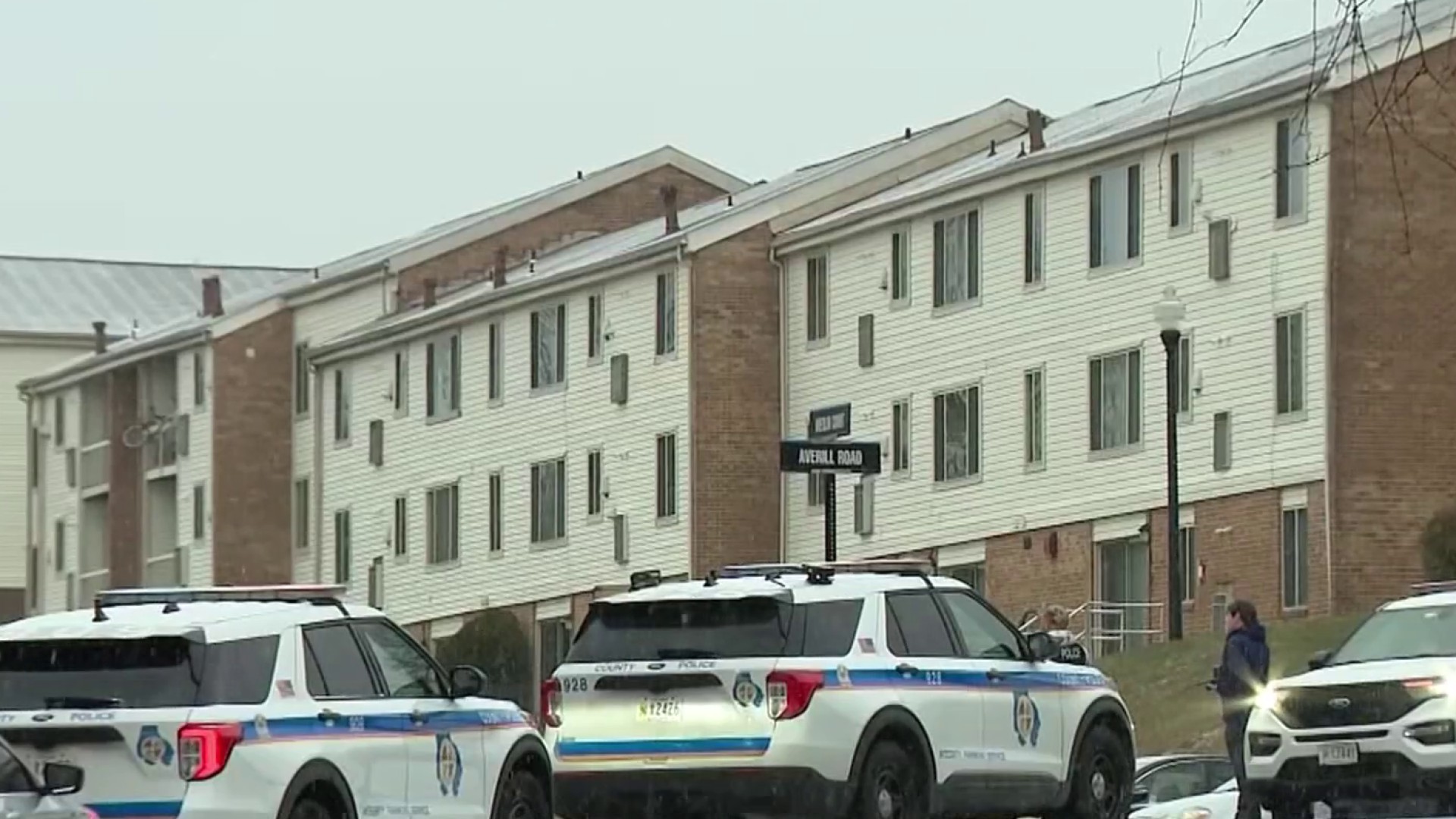
Between Alexandria's Del Ray neighborhood and the Crystal City neighborhood of Arlington is a swath of land home to a vibrant Hispanic community.
With bakeries and street vendors clustered around Mt. Vernon Avenue, the neighborhood of Chirilagua became home to Salvadoran immigrants escaping poverty and a bloody civil war starting in the 1980s.
So when Amazon announced its decision to split the site of its new East Coast headquarters between New York City and Northern Virginia, Evelin Urrutia's heart jumped.
Urrutia, an advocate for tenants' and workers' rights in Alexandria, said she fears the decision to open a tech hub a mile from Chirilagua will devastate the low-income, working-class community that already faces rising rents and immigration raids.
We've got the news you need to know to start your day. Sign up for the First & 4Most morning newsletter — delivered to your inbox daily. >Sign up here.
For many Chirilagua residents, Amazon's arrival threatens the end of the community they love, bringing increased housing costs, new residents and creeping gentrification.
To understand the value Chirilagua represents to the Hispanic population of Alexandria, Urrutia says you only have to walk down Mt. Vernon Avenue on a warm day.
Local
Washington, D.C., Maryland and Virginia local news, events and information
"You walk around and you feel like your country is here. In Central America, we have a lot in common, like the music. Sometimes the music is really loud from the stores and you start dancing. It's amazing," Urrutia said.
The neighborhood traces its name to a town in El Salvador. The Northern Virginia area boomed in the '80s, as war ravaged the Central American country and displaced more than a million people, according to the Migration Policy Institute.
Many of those who immigrated during the '80s and '90s settled in the D.C. area and ended up on the Arlington-Alexandria border, sometimes known as Arlandria. Waves of new arrivals brought with them new immigrants from Guatemala, Honduras and Mexico, giving Chirilagua a multicultural feel.
"What makes it unique is that the people have been here for so long. We are rooted in," Urrutia said. "If you say, 'Oh, I live in Chirilagua,' people know what it is."
For Teofila Gomez, Chirilagua's appeal also is connected to community organizing. Years of growth in the Hispanic community have led to Spanish-language programs at local schools, such as Mount Vernon Community School, which bills itself as Alexandria's first dual-language school. Gomez and her friend Ana Santos now are lobbying for new dual-language programs at nearby middle and high schools.
The Mount Vernon Community School's parent-teacher association hosts one of its monthly meetings at the Casa Chirilagua community center and asks Latino parents to bring Hispanic dishes to share.
Gomez, who has lived in Chirilagua for more than 17 years, said the nearby Latino-owned stores and businesses add to the appeal.
"The advantage of living in this area is that everything is accessible: the park, the laundromat a half-block away. You have all the businesses to buy your food," she said.
But they fear that Amazon's arrival a mile away will threaten the community's cohesion.
"People don't understand that everything will get more expensive. Everything's going to go up. We're talking about rent, household goods, food, everything. Not just the rent," Gomez said.
Urrutia, who is the executive director of Tenants and Workers United, said she worries that Amazon's arrival will speed up gentrification.
"As soon as Amazon lands, all the gentrification from Del Ray is coming. It's going to move to this area, because the owners of these apartments and businesses — they're going to start to want to make this area beautiful for different people," she said.
Since Amazon announced its decision to move into Arlington in early November, Urrutia said she has been thinking about how the surrounding communities will change.
Local Government Plans Ahead on Housing
Amazon pledged to create 25,000 jobs in Northern Virginia. Local leaders say the influx of people may contribute to an affordable housing crisis.
"In the short term, there will be housing pressures even if some of them are just of people taking advantage of the opportunity to raise rent," said Helen McIlvaine, director of Alexandria's Office of Housing. "But we think the market will increase production."
McIlvaine said the reports that her office is monitoring show that rental prices may increase by 4 to 6 percent across the city, but that the hikes are similar to what the city has seen in the past.
Alexandria City Manager Mark Jinks told WTOP that the city is working to raise the number of housing units to try to counteract increasing housing costs, like those seen in Seattle when Amazon opened its headquarters there.
"There are already new resources being created to potentially meet this," McIlvaine said. "The city has a very strong commitment to working in communities and doing outreach and making sure people understand."
According to McIlvaine, Alexandria uses public housing, loans, grants and subsidies to meet its affordable housing goals. The city already has about 1,250 public housing units overseen by the public housing authority and maintains them according to the city's commitment to preserve housing. Thus, McIlvaine said she sees opportunities for the city to secure more committed affordable housing from private developers.
Caridad Palerm, a housing analyst for the Alexandria Office of Housing, said market-affordable units are at risk. The landlords for these units receive government subsidies to keep rents low.
"They are more affordable, but there isn't anything to prevent rents from increasing," Palerm said.
According to data provided by the Office of Housing, the majority of affordable housing in the Chirilagua area is market-affordable housing. Of the eight housing units in Chirilagua listed by the Office of Housing, six are privately owned.
McIlvaine said the Office of Housing will increase its efforts to engage with Chirilagua residents, especially through Tenants and Workers United.
"It's a good time for us to check in with them," she said. "We see this housing issue as being regional, and we are continuing to use this as a way to be more effective in our policies and programs."
Who Will Amazon HQ2 Benefit?
In the meantime, Urrutia said she fears that city officials do not understand Chirilagua residents' concerns.
"You look around and everything that they are building is for people who earn a lot of money," she said. "When they talk about working class, they talk about teachers, firefighters, and they talk about police. But for us, the working class are the people who make the minimum, who are below the poverty level, who don't qualify for anything, especially if they don't have documentation."
Gomez worries that the construction of new luxury apartments and the new jobs Amazon is set to bring will not help her or her community because working-class residents do not have the skills or education level required by Amazon.
"So who will those jobs go to?" she said. "The people who are going to arrive here, and the people who are going to live in the new luxury apartment buildings like the ones that are planned here, they are the ones who will kick us out of here."
Urrutia agreed, and said she believes that city and state officials have turned a blind eye to those who will be left behind once Amazon arrives.
"They're putting a lot of funding into bringing Amazon, but they're not putting funding into keeping their communities, because they think this is a great thing, but it's not a great thing for everyone," she said. "Those jobs aren't going to be for people like us. Those are high-tech jobs. They're not going to find them in Chirilagua."
If the cost of living spikes, Gomez and Santos said they know they will have to move out.
"People will move in with each other and divide rent. They'll rent an apartment and have two or three families live together. But who wants to live like that?" Gomez said. "I don't want to leave. I don't want my community to fall apart."



